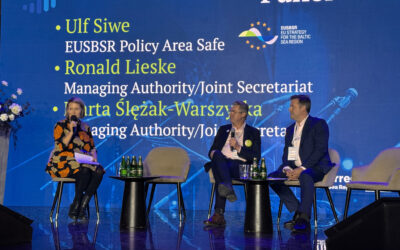The 8th meeting of the Joint Programming Committee (JPC), chaired by the Lithuanian Ministry of Interiors, was held on 29-30 September 2021 right after the Kick-off event of the New Programme 2021-2027. The core decision at the meeting was the approval of the Programme Document. The Committee agreed on details for Programme implementation which all pave the way for launching the new Programme.
Programme Document approved
Chaired by Deimante Jankunaite from the Ministry of the Interior of the Republic of Lithuania, the 8th meeting was introduced with positive reflections on the ongoing 12th Annual Forum of the Strategy of the Baltic Sea Region hosted by Lithuania, Kick-off event of the New Programme 2021-2027 and valuable contributions to the event by the Managing Authority/Joint Secretariat (MA/JS) and the members of the Joint Programming Committee (JPC).
After almost two years of discussion with broad participation of stakeholders in all Programme countries, the Joint Programming Committee approved the new Interreg Baltic Sea Region Programme Document. The next step before submitting the Programme to the Commission is the approval of the Programme in all Programme countries. The plan is to submit the Programme for Commission approval in January 2022.
Further important documents
Another document to be submitted with the Programme to the Commission is the methodology on how the Programme will measure its achievements. The JPC had agreed on indicators for the Programme priorities already earlier. Now it agreed on how the targets for the indicators are set.
Furthermore, the MA/JS updated the JPC members on the latest developments of finalizing the Programme Manual based on the received comments from the Programme countries. Aimed at simplifying processes, being more specific on objectives and involving the relevant target groups, the JPC members exchanged on few open questions for further clarifications and unified approach to financing schemes, co-funding rates for project partners outside the Programme area and legal aspects like for instance state-aid rules. The JPC aims at endorsing the Programme Manual at its meeting in November. After that the Programme Manual will be published on the Programme website and MA/JS will start guiding project applicants about the rules of the new Programme.
Well prepared for communicating the New Programme
The JPC members were updated on the latest developments in communication of the New Programme and the newly elaborated toolbox available for making the Programme more visible, accessible and understandable. The participants of the meeting were kindly encouraged to act as multipliers and spread the messages in their national channels. The newly launched Programme website, the insightful on-line tutorials as well as the interactive matchmaking platform are now available for applicants.
Call timelines
The JPC agreed on the outlined schedule as regards application rounds. The Programme will pre-launch the first calls for applications in November. The official opening of the calls will happen in the beginning of 2022 as soon as the Programme is submitted to the Commission. The information about the upcoming call and related procedures will be timely provided at the Programme portal. Once the call is announced, applicants will be informed also on how to engage interested organisations from the neighboring countries in partnerships.
Next steps in financial support
The participants of the meeting exchanged views on the technical assistance budget proposed by the MA/JS. The allocation of funds will secure that enough resources are planned for managing the upcoming Programme. Funds will be available also for countries for their activities on national level.
A way ahead
The well-received agreements have brought clarity to many issues. Remaining open issues will be addressed at a next Joint Programming Committee meeting on 10-11 November.







